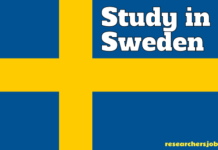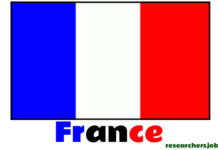Marie Skłodowska-Curie Postdoctoral Fellowships: The European Commission offers Marie Skłodowska-Curie Postdoctoral Fellowships for up to 24 months, providing living and mobility allowances, family support, research budgets, and access to a global network. Eligible candidates must hold a PhD, have up to 8 years of postdoctoral experience, and not have resided or worked in Germany for more than 12 months prior to September 11, 2024.
Designation: Marie Skłodowska-Curie Postdoctoral Fellow
Research Area: Multidisciplinary
Location: DKFZ (German Cancer Research Center), Germany
Eligibility/Qualification:
- Hold a PhD degree, defended before September 11, 2024
- Maximum 8 years of postdoctoral research experience by September 11, 2024
- Not have resided or worked in Germany for more than 12 months in the 36 months immediately before September 11, 2024
Job Description:
- Conduct independent research projects supported by the Marie Skłodowska-Curie Fellowship
- Collaborate with DKFZ Principal Investigators on research proposals and projects
- Attend Marie Curie MasterClasses and receive personalized feedback from grants experts
- Submit application materials by May 13, 2024, including CV, motivation letter, and choice of Principal Investigators
- Shortlisted candidates will collaborate with Principal Investigators to develop proposals for the fellowship
How to Apply:
- Send application via mariecuriemasterclass@dkfz.de by May 13, 2024, including:
- Form: “Registration as pre-candidate for Marie Skłodowska-Curie Postdoctoral Fellowships (MSC-PF, Call 2024)”
- CV with list of publications (max. 3 pages)
- Motivation letter (max. 1 page) detailing research interests and career plans
- Choose up to three DKFZ Principal Investigators from the provided list
- Selected candidates will join online seminars (MasterClasses) on June 26, July 3, and July 10, 2024
- Submission deadline for MSC-PF proposal to the European Union is September 11, 2024
Last Date for Apply: May 13, 2024
For inquiries, contact mariecuriemasterclass@dkfz.de.
Note: Submission of a proposal and participation in support activities do not guarantee a postdoctoral position at DKFZ. Employment contract is contingent upon award of the Marie Curie Postdoctoral Fellowship by the European Commission.
- Prof. Dr. Christof Niehrs (Cell Biology and Tumor Biology)
- Developing ROTACs for Targeted Cancer Therapy 🎯
- Targeting casein kinase 1 – DDX3 signaling for cancer drug development 🔬
- Prof. Dr. Tobias Dick (Redox Regulation)
- Investigating ferroptosis resistance in tumor cells 🧬
- Exploring sulfur metabolism’s role in cytoprotection ⚗️
- Developing tools for studying redox metabolism 🛠️
- Dr. Wilhelm Palm (Cell Signaling and Metabolism)
- Dissecting cancer metabolism through CRISPR screens 🧬
- Understanding oncogenic signaling’s regulation of mitochondrial metabolism 🧪
- Characterizing mammalian genes of unknown function 🧬
- Prof. Dr. Michaela Frye (Mechanisms Regulating Gene Expression)
- Researching RNA modifications in cancer and immune cells 🧬
- Focusing on early detection and prevention of cancers 🚨
- Prof. Dr. Karsten Rippe (Functional and Structural Genomics)
- Analyzing therapy resistance mechanisms through single-cell multi-omics 🧬
- Investigating phase separation in chromatin states 🧬
- Studying intra-tumor heterogeneity through spatially resolved omics 🌐
- PD Dr. Maïwen Caudron-Herger (RNA-Protein Complexes & Cell Proliferation)
- Studying riboregulation in mitosis 🧬
- Investigating the impact of RNA on mitotic protein regulation 🧬
- Prof. Dr. Rocio Sotillo (Molecular Thoracic Oncology)
- Utilizing in vivo CRISPR screens for lung cancer research 🧬
- Exploring tumor suppressors and resistance mechanisms 🛡️
- Prof. Dr. Jeroen Krijgsveld (Proteomics of Stem Cells and Cancer)
- Maintaining proteostasis and single-cell proteomics 🧬
- Analyzing proteome networks using mass spectrometry 🌐
- Prof. Dr. Benedikt Brors (Applied Bioinformatics)
- Applying machine learning to understand tumor-immune microenvironment in pancreatic cancer 🧬
- Utilizing multiomics data analysis for predictive modeling 📊
- Prof. Dr. Stefan Fröhling (Translational Medical Oncology)
- Focusing on molecularly guided cancer therapies 🎯
- Investigating precision oncology and molecular pathogenesis of rare cancers 🧬
- Dr. Christiane Opitz (Metabolic Crosstalk in Cancer)
- Studying metabolic regulation at the interface of cancer and the immune system 🧬
- Dr. Ana Banito (Soft-Tissue Sarcoma)
- Researching cell of origin for pediatric sarcomas 🧬
- Investigating tumor maintenance and immune escape mechanisms 🛡️
- Dr. Aurélie Ernst (Genome Instability in Tumors)
- Deciphering chromothripsis’s mechanistic basis in cancer 🧬
- Studying its occurrence and translational implications 🌐
- Dr. Lena Kutscher (Neurodevelopmental principles underlying pediatric brain cancer)
- Investigating neurodevelopmental principles in pediatric brain cancer 🧬
- Dr. Federico Canzian (Genomic Epidemiology)
- Studying genetic epidemiology of cancer susceptibility and prognosis 🧬
- Dr. Mahdi Fallah, MD, PhD (Preventive Oncology)
- Researching risk-adapted cancer screening and prevention strategies 🚨
- PD. Dr. med. Titus Brinker (Digital Biomarkers for Oncology)
- Developing explainable AI in image classification for oncology 🤖
- Utilizing deep learning strategies for high-throughput proteomics 🧬
- Prof. Dr. med. Michael Platten (Neuroimmunology and Brain Tumor Immunology)
- Utilizing immune repertoires and AI for personalized cell therapies in cancer 🧬
- Rapid, high-throughput manufacture of DANN delivery vectors 🧬
- Dr. Felix J. Hartmann (Systems Immunology and Single-Cell Biology)
- Quantifying immune function and cellular metabolism in human cancer spatially 🌐
- Prof. Dr. Dr. Henri-Jacques Delecluse (Pathogenesis of Virus Associated Tumors)
- Investigating genetics and structural biology of Epstein-Barr virus 🦠
- Dr. Marco Binder (Dynamics of early viral infection and the innate antiviral response)
- Elucidating the interplay between endogenous viruses and the immune system in cancer development 🦠
- Prof. Dr. Oliver Jäkel (Medical Physics in Radiation Oncology)
- Relating MRI to morphological biomarkers for prognostic response assessment during radiotherapy 🧬
- Prof. Dr. Leif Schröder (Translational Molecular Imaging)
- Using MRI and NMR spectroscopy with hyperpolarized contrast agents for molecular imaging 🧬









